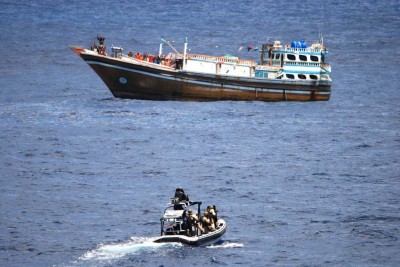Latest piracy news (April 10, 2011)
(BRUXELLES2) This week has been marked by a resumption of legal proceedings against pirates. Breaking with the habit acquired in recent months of releasing pirates, the international or national forces (United Arab Emirates and the Netherlands) which apprehend suspects are trying, as far as possible, to have them tried on the spot or repatriate them to their country to be judged there. A necessity ! According to an estimate by a European soldier, "there are several cases of recidivism among pirates. Clearly, suspects had already been apprehended and then released. Thanks to the identification system, we can estimate this figure at around 10% of pirates".
Sunday (April 10). The Iranian navy foils an attack on an Iranian supertanker.
The Voyager 1, an Iranian supertanker escaped a pirate attack by two pirate skiffs off the southwest coast of Pakistan, announces the Fars agency which takes up a press release from the Iranian navy. This intervened and put the pirates to flight. It is not known if there were casualties during the exchange of fire. Another Iranian tanker, the Najm, escaped a similar attack earlier this week (April 4) in the Gulf of Aden.
Sunday (April 10). The Indonesian army engaged against pirates?
The Indonesian army could be hired to free hostages from the pirates, reports the national press. "We are considering this possibility," explained the Navy spokesman.
Saturday (April 9). Anti-piracy mission canceled for LV Le Hénaff
The LV Le Hénaff notice, which was stopping at Souda before passing through the Suez Canal to join the anti-piracy mission, received a new route order. No Suez or pirates, heading off to Libya.
Friday (April 8). A hijacked German ship just 35 miles off the coast of Oman.
 A German freighter, the Mv Susan K, flying the flag of Antigua & Barbuda was captured by a dozen pirates 200 miles northeast of Salalah (Oman) or only 35 miles from the Omani coast, while on its way to Port Sudan from Mumbai (India). The crew includes 4 Ukrainians and 6 Filipinos. The vessel was registered at MSCHOA
A German freighter, the Mv Susan K, flying the flag of Antigua & Barbuda was captured by a dozen pirates 200 miles northeast of Salalah (Oman) or only 35 miles from the Omani coast, while on its way to Port Sudan from Mumbai (India). The crew includes 4 Ukrainians and 6 Filipinos. The vessel was registered at MSCHOA
Thursday (April 7). Greek oil tanker freed for ransom
The Greek supertanker Irene SL - with a capacity of 319.000 tons - captured on February 9, with its crew of 25 people (17 Filipinos, 7 Greeks, 1 Georgian), is free. A $13,5 million ransom was paid, hackers told Reuters.
Thursday (April 7). No German marines aboard merchant ships
The German navy will not be able to accompany or put military personnel on board its merchant ships, as demanded by the maritime industry. "It is not feasible from a logistical, legal and administrative point of view..." explained Thomas Kossendey, Parliamentary State Secretary for Defence. "I don't see how we could have the number of units needed. Many of Atalanta's partners are rather stingy in terms of units made available... And I see no inclination to increase it."
Thursday (April 7). 25 years in prison in the USA for a pirate.
Jama Idle Ibrahim, a 39-year-old Somali, was again sentenced in Washington by a federal court to 25 years in prison for having attacked, in November 2008, a Danish commercial ship, the MV CEC Future, transporting American goods and took his crew hostage. This is his second conviction in the United States. He had previously sentenced to 30 years in prison in Virginia for participating in the attack on the military vessel USS Ashland, in the Gulf of Aden, in April 2010.
Thursday (April 7). An Iranian dhow used as a mother ship taken over by the Spanish Navy

The Spanish frigate "Canarias" - which is taking part in the European operation Atalanta - frees an Iranian fishing boat, detained for 5 months by Somali pirates. The dhow had been spotted about 150 miles from the pirate base at Garacad (Somalia). The visit on board made it possible to apprehend seven suspects and to seize various materials usually used by the pirates (including 5 RPG grenade launchers and a skiff). They await instructions are awaited.
Wednesday 6 April). 18 suspects arrested by Finns.
The Finnish frigate FNS pohjanmaa - which is part of the EUNavfor Atalanta operation - disarmed a group of pirates about 250 miles south of Salalah (Oman). This mother ship and two skiffs were suspected of having attempted to capture a merchant ship the day before. To stop the suspects, the Finns fired warning shots. 18 suspects were apprehended as well as a "large amount of fuelThis is the first action of force by the Finnish frigate since its engagement. The mother ship was sunk. point of view of Finnish law could not be engaged. The suspects are, for the time being, kept on board.”Their health is good“, explained the captain of the ship, Mika Raunu.
Tuesday, April 5). 10 pirates will be tried in the Emirates.
The ten hackers caught red-handed in the attack on the MV Arrilah I by the commando forces of the Emirates (with the help of the American naval group of the USS Enterprise) were landed ashore at Mina Zayed, taken care of by the police, to be delivered to the justice of the Emirates. They should be tried in a federal criminal trial court. This will be the first trial of its kind before the courts of the Emirates. A sailor from the ship was injured in the assault.
Tuesday, April 5). Armed guards on Indian ships.
The Indian government is exploring the possibility of shipping companies recruiting armed guards on board their ships, according to a Navy spokesman. The ministers of defence, foreign affairs and trade are working on the issue to establish a legislative framework (either a law or an immediately enforceable "order") at the request of the industry. It could be - as the Indian press mentions - rather former members of the Navy. Several problems remain to be resolved, such as the training and supervision of these guards and their status in the port of destination.
Monday april 4th). Two pirate skiffs disarmed and freed.
The Turkish frigate TCG Giresun (engaged in NATO operation Ocean Shield) apprehended two suspected skiffs (pirates) about 70 miles off the Somali coast. The suspect skiffs had been spotted in the Gulf of Aden International Transit Corridor (IRTC) by a Japanese patrol aircraft. The aerial photographs had made it possible to identify weapons and various materials which did not leave too much doubt about the intentions of its occupants. The nearby Turkish frigate was tasked with apprehending the "guys". Assisted by the ship's helicopter, the fast boats stopped the two skiffs, discovering ammunition for assault rifles, grenade launchers and ladders. The suspects, once disarmed, were... released.
Monday april 4th). A destroyed whaler
The Spanish ship "Infanta Elena", which is taking part in the European operation Eunavfor Atalanta, intercepts, 89 nautical miles south of Mombasa (Kenya), a whaler type ship with two suspected pirates. On board were three cell phones, a radio, AK-47 cartridges, nine barrels of fuel and four of water, and some hooks and boarding gear. But nothing sufficient to allow for a trial. The whaler is destroyed, the suspects freed and brought ashore. NB: the other suspects had already fled aboard two skiffs.
Sunday (April 3). Strong exchange between pirates and Dutch marines, 2 pirates killed.

The Dutch frigate HMS Trump - part of NATO's anti-piracy operation - freed an Iranian fishing vessel which was being used by pirates as a mother ship. The Dutch had sent two search boats to examine this boat, reported as suspicious. The exchange was tough. "The suspects fired at our ships“specifies the navy. 2 pirates were killed. 10 pirates were arrested while trying to flee aboard skiff and 6 others arrested on the boat.”After examination, the bodies were thrown into the water. Due to the weather, it was not possible to keep them on board"said a defense spokesperson. The 16 fishermen, held hostage on board for 4 months, were released. On Wednesday (April 6), the 16 surviving pirates were charged by a Dutch judge, , and taken into custody on board. They are suspected of attempted murder.”The hackers do not appear to have acted on impulse but with the intent to kill", we believe in the Dutch public prosecutor's office. They could therefore be repatriated and tried by a Dutch court. This would be the first European case where pirates are tried not for acts of piracy but also for attempted murder of soldiers. NB: this possibility of referral to European courts, apart from any special jurisdiction in matters of piracy, could be used more.
Friday (April 1). The debate over the presence of armed guards on board continues in the Netherlands.
The report of the Advisory Council on International Affairs (AIV) makes a clear distinction between private and public responsibilities. It is shipowners and captains who are primarily responsible for the safety of their vessels. But the use of private armed guards on board would threaten the state's monopoly on the use of force. The Dutch government recommends two lines of thought: strengthening self-protection measures on board ships. ". And for a "small number of vulnerable ships", to "the government, in certain circumstances to ensure the protection of maritime transport". A working group chaired by Professor de Wijkerslooth is working on the issue.

